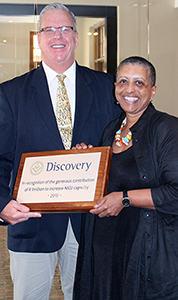Latest News Archive
Please select Category, Year, and then Month to display items
14 May 2024
|
Story ANTHONY MTHEMBU
|
Photo Supplied
 Contemporary artist Ibrahim Mahama engaging with students during his visit to the Department of Fine Arts at the University of the Free State (UFS).
Contemporary artist Ibrahim Mahama engaging with students during his visit to the Department of Fine Arts at the University of the Free State (UFS).
Ghanaian contemporary artist, Ibrahim Mahama, visited the Department of Fine Arts at the University of the Free State (UFS) to share insights with staff and students during his stay in the country.
Dr Adelheid Von Maltitz, Senior Lecturer in the Department of Fine Arts at the UFS, highlighted the significance of Mahama’s visit which took place from 21 to 28 March 2024, marking the first instance of such interaction between a Fine Arts department in South Africa and Mahama. She remarked, “It is truly astounding that a person of his calibre dedicated time to focus on our department, and I believe this has catalysed a positive shift within our department.”
Mahama’s impactful presence at UFS
Dr Von Maltitz emphasised that Mahama’s visit aimed to offer staff and students a glimpse into his artistic process and mindset. During his time at the UFS, Mahama, who was virtually overseeing his latest recent large-scale artwork titled Purple Hibiscus, which involved wrapping the Barbican Centre in London, engaged extensively with staff and students from the department about their research. He shared insights into his creative journey, presented select works, and conducted critique sessions with fourth year and postgraduate students, among other activities. Dr Von Maltitz believes this interaction, particularly with students, has significantly bolstered their confidence as aspiring artists, preparing them for professional endeavours.
Broader implications and future prospects
Mahama’s visit not only energised the department’s academic environment but also holds broader implications. Dr Von Maltitz asserted that it will solidify the department’s identity nationally and create avenues for students to pursue residencies in countries like Ghana. Therefore, maintaining a fruitful relationship with Mahama remains a priority for the department.
Reflecting on the visit Dr Von Maltitz concluded, ‘’the key takeaway, especially for the students, was witnessing the potential of their works within the broader South African and international contexts. “
Neonatal Care Unit receives donation to expand capacity
2015-10-28
 With the best care and technology available,
the survival rate of premature
babies is about 85%. The neonatal intensive
care unit at the Universitas hospital can now
expand its capacity thanks to a donation of
R1 million by the Discovery fund.
From the left is Prof André Venter.
Head: Department of Paediatrics and
Child Health at the UFS, and mrs Ruth Lewin,
Head: Corporate Sustainability at Discovery.
|
The smallest people need the greatest care. This care is being provided by the neonatal unit in the Children’s Wing of the Universitas Hospital. This project of the University of the Free State (UFS), under the leadership of Prof Andre Venter, has led to several miracles regarding child health since its inception.
Now, thanks to a donation of R1 million rand from the Discovery fund, this unit can expand its capacity and treat more premature babies.
About 14% of babies in South Africa are born before the 37th week of pregnancy. These babies are born with a very low birth weight, and are in need of critical care. The neonatal intensive-care unit at Universitas Hospital is currently equipped to take care of about 14 premature babies at a time, from birth to discharge. However, because of the high incidence of premature births in the hospital’s service area, the unit needs about 45 beds.
The aim of the Children’s Wing Project is to expand the neonatal intensive-care unit in order to meet the demands of the hospital’s service area, which reaches as far as the Southern Cape. The Discovery Fund recently donated R1 million to the project, which will be used to expand the capacity of the neonatal intensive-care unit.
“With the best care and technology available, the survival rate of premature babies is about 85%. Without this, half of all premature babies would die,” says Prof Venter, Head: Department of Paediatrics and Child Health at the UFS.
“This is the reason why private and public partnerships, such as the one with Discovery, are essential to make specialised services available to the most vulnerable people. Discovery has made a significant contribution to the project without which we would not have been able to expand the capacity of the unit